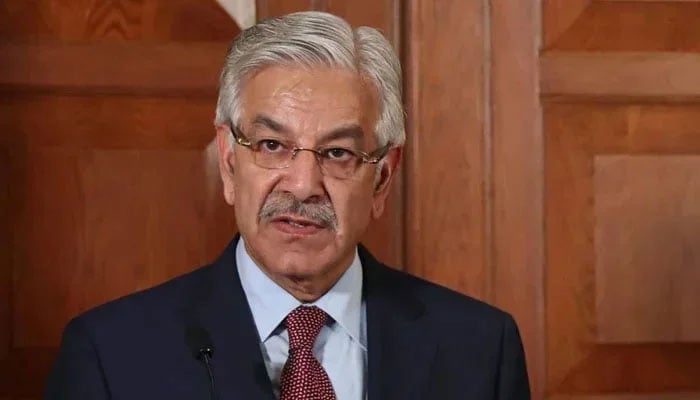Faizabad sit-in inquiry report lacks 'authenticity, credibility': Khawaja Asif
"The Faizabad inquiry commission must introspect about whether it fulfilled its duty or not," says defence minister
Defence Minister Khawaja Asif Wednesday criticised the findings of the report compiled by the inquiry commission to probe the Faizabad sit-in, stating that it lacked "authenticity", "credibility" and held no value.
The inquiry commission constituted to investigate Tehreek-i-Labbaik Pakistan’s (TLP) 2017 Faizabad sit-in exonerated former Inter Services Intelligence (ISI) director general Lieutenant General (retd) Faiz Hamid in its report.
"Faizabad commission was a joke as Generel (retd) Hamid and former army chief Gen (retd) Qamar Javed Bajwa did not appear before the commission but only political workers like me did," said the defence minister during an interview with a private TV channel.
The defence minister added that when he appeared before the commission, he realised that there was no seriousness there.
"The Faizabad inquiry commission must introspect about whether it fulfilled its duty or not," he added.
The Faizabad sit-in commission, which was constituted on Supreme Court orders following the case pertaining to the 2017 sit-in at Faizabad led by former Tehreek-e-Labbaik Pakistan (TLP) chief Khadim Hussain Rizvi, gave a clean chit to the former spymaster and former Punjab Rangers director general Major General (retd) Azhar Naveed Hayat.
Both the former military officers were alleged of distributing money among participants of the sit-in protest in the federal capital. At the time of the protest, Hamid was heading ISI's counter intelligence wing and held the rank of a major general.
The commission was led by Dr Akhtar Ali Shah, a former officer of the Khyber Pakhtunkhwa Police, and included senior PAS official Khushhal Khan and former inspector general Tahir Alam.
The inquiry body found out that then-army chief and ISI director general had given Hamid permission to sign the agreement as an arbitrator. Former prime minister Shahid Khaqan Abbasi and former interior minister Ahsan Iqbal had also agreed to signing of the accord by Hamid on November 25, 2017, following which the demonstrators dispersed.
The probe body was tasked with identifying the perpetrators who facilitated the sit-in. However, it simply suggested taking legal action against the individuals in light of the federal government and Punjab's findings.
In November last year, the caretaker federal government constituted the inquiry commission for the implementation of the top court’s 2019 Faizabad verdict.
The probe panel was constituted on the order of the Supreme Court under the chair of retired IGP Akhtar Ali Shah after the apex court rejected the fact-finding committee report constituted by the government.
Faizabad verdict
In November 2017, the top court took suo motu notice of the three-week-long sit-in, which was held against a change in the finality-of-Prophethood oath, termed by the government as a clerical error, when the government passed the Elections Act 2017.
The sit-in was called off after the protesters reached an agreement with the government.
On February 6, 2019, a two-member bench of the apex court comprising recommended that persons, issuing an edict or fatwa to harm another person or put another person in harm’s way must be dealt with an iron hand and prosecuted under relevant laws.
It also ruled that the intelligence agencies must not exceed their respective mandates. Later, the bench disposed of the suo motu case regarding the Faizabad sit-in.
-
Security forces gun down 30 terrorists in multiple IBOs in KP: ISPR
-
MQM-P calls for new province in Sindh
-
US report validates Pakistan military edge over India: PM
-
Banned TTP poses serious threat to Pakistan security: UNSC panel
-
CM Afridi clarifies remarks on by-poll after ECP requests army deployment
-
Dubai sees 3.2m Pakistani passengers in 2025 as airport sets new milestone
-
Security forces kill 23 Indian proxy terrorists in KP's Kurram
-
Pakistan to construct island to boost oil exploration: report












